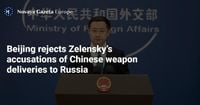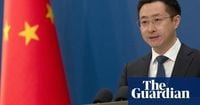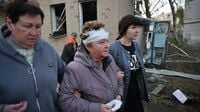A Chinese Foreign Ministry spokesperson categorically denied that China was supplying arms to Russia at a press briefing on Friday, a day after Ukrainian President Volodymyr Zelensky claimed to have “information” about Chinese weapon deliveries to Russia. “The Chinese side has never provided lethal weapons to any party in the conflict, and strictly controls dual-use items,” Foreign Ministry Spokesperson Lin Jian said on Friday, April 18, 2025, in comments reported by AFP. Lin stressed that Beijing’s position on the Ukraine issue was “consistent and clear” and that China had “always actively made efforts for a cessation of hostilities and peace talks.”
Zelensky said during a press briefing on Thursday, April 17, 2025, that he had received information from the Security Service of Ukraine that China was sending “artillery” to Russia, without specifying the weapons involved. He added that some Chinese weapons were being produced on Russian territory, something he said Kyiv would be able to discuss in greater detail next week.
This is the second time this month that Zelensky has challenged Beijing over its stated neutrality in the war in Ukraine. Last week, Zelensky accused Russia of recruiting Chinese citizens to serve in its military via TikTok and other social media platforms shortly after revealing that Ukrainian forces had captured two Chinese citizens fighting for Russia in eastern Ukraine. Responding to those claims, Beijing denied providing troops to fight in Ukraine, stressing that it always advised Chinese nationals to avoid “any form of involvement” in foreign conflicts.
Meanwhile, the situation in Ukraine remains dire as a Russian missile strike killed one person in the northeastern city of Kharkiv, with a separate drone attack in the nearby city of Sumy claiming another life. At least five children were among dozens of people injured in Friday morning’s attack on Kharkiv, which damaged 15 residential buildings, a business, and an educational facility. According to Kharkiv Mayor Ihor Terekhov and emergency services, the attack occurred around 5am local time when curfews ended and people began their daily routines.
In Sumy, a drone hit a bakery producing Easter cakes, killing at least one and injuring another person. Reporting from Kyiv, Al Jazeera’s Zein Basravi noted that Russia also targeted cities including Lviv, Dnipro, Mykolaiv, and Kyiv, with multiple missile, drone, artillery, and rocket attacks reported. “In Kharkiv, civilian infrastructure was damaged, one person was killed, and 74 were injured,” Basravi reported. “Of the 74, five were children aged 3, 4, 14, 16, and a 17-year-old boy. There was damage to dozens of apartments and vehicles.”
In Dnipro, a missile attack hit an area with businesses, including a gym, hotel, and an office block, causing significant damage. Ukrainian air defenses were reported to have shot down three cruise missiles and nearly two dozen drones during the assaults.
Despite the ongoing violence, U.S. Secretary of State Marco Rubio indicated that President Donald Trump is prepared to abandon efforts to negotiate peace between Russia and Ukraine unless concrete progress is seen within days. Speaking in Paris following discussions with European and Ukrainian officials, Rubio signaled a looming cut-off point for the White House’s involvement in the stalled peace initiative. “We’re not going to continue with this endeavor for weeks and months on end. So we need to determine very quickly now, and I’m talking about a matter of days, whether or not this is doable in the next few weeks,” Rubio told reporters.
On Thursday, April 17, 2025, President Trump expressed optimism about finalizing a deal with Ukraine next week that would allow the United States access to the country’s mineral resources. This development suggests that, despite political friction, economic cooperation remains a key incentive in the relationship between the two nations.
President Zelenskyy stated that while Russia had seemingly scaled back its targeting of energy infrastructure, the overall volume of missile and drone attacks remained unchanged, with civilian sites now being the primary targets. Furthermore, Moscow warned of potential escalation if Germany proceeds with plans to send Taurus long-range missiles to Ukraine. Russia’s ambassador to the United Nations, Vassily Nebenzia, declared that such a move would mark Germany’s direct entry into the war.
The Taurus missile system, which has a range of more than 500 kilometers (310 miles), is designed to penetrate fortified positions, making it a potentially game-changing addition to Ukraine’s arsenal. Nebenzia also accused Kyiv of ignoring a partial ceasefire agreement reached in mid-March during a phone call between Russian President Vladimir Putin and President Trump, claiming that Russia had honored the accord while Ukraine had conducted over 120 attacks, including on Russian power infrastructure.
In a further escalation of tensions, Zelenskyy accused China for the first time of providing weapons to Russia, alleging that Beijing was supplying artillery and manufacturing arms within Russian territory. “We finally have information that China is supplying weapons to the Russian Federation,” he said, without specifying whether he meant shells, launchers, or both. Beijing on Friday denied giving any party in the Ukraine war lethal weapons, reiterating its stance of neutrality.
Zelenskyy’s remarks follow the capture of two Chinese nationals fighting for Russia, which has further strained already fraught relations between Kyiv and Beijing. Ukraine also announced sanctions against three Chinese companies, expanding its blacklist as part of ongoing efforts to curb support for Russia’s war effort, according to a presidential decree published on Friday. The decree names Beijing Aviation and Aerospace Xianghui Technology Co. Ltd, Rui Jin Machinery Co. Ltd, and Zhongfu Shenying Carbon Fiber Xining Co. Ltd—all registered in China—as targets of the new restrictions.
The companies were listed alongside several Russian firms, although the Ukrainian government has not publicly detailed the specific grounds for sanctioning the Chinese firms. As the conflict continues, the geopolitical ramifications of these developments will likely unfold in the coming days, affecting not only the involved nations but also their international relations.






